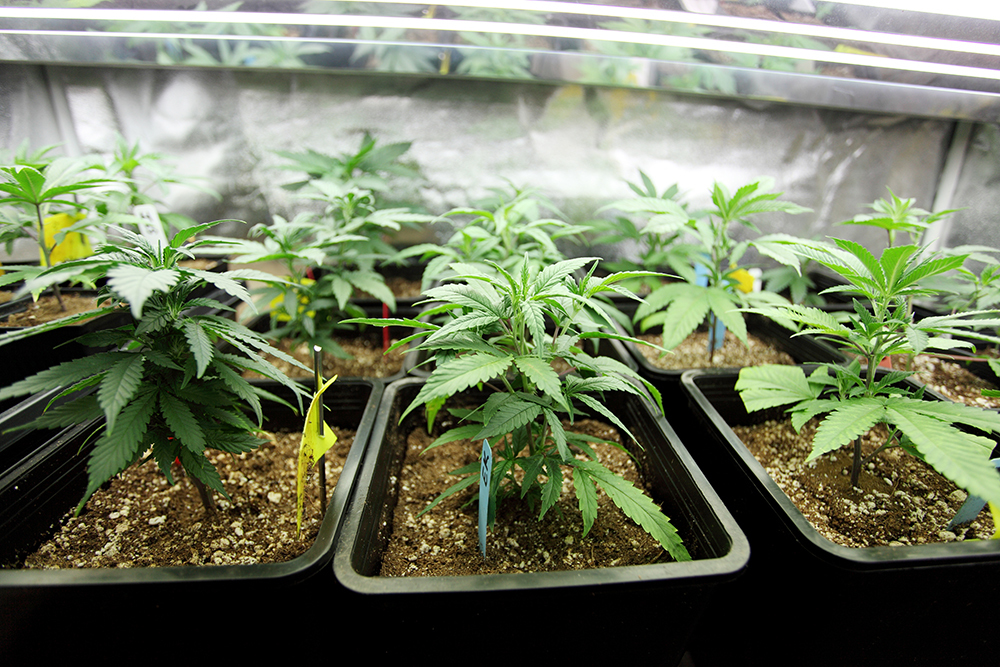
As cannabis becomes legal for medical and recreational purposes in various states across the country, more and more moms are using the plant for a variety of benefits, from stress to pain relief. At the same time, new research on smoking marijuana and breastfeeding is being conducted, helping to inform nursing moms' decisions around cannabis use. Here, seven of the latest facts on marijuana and breast milk.
1. It is possible to pass low levels of the psychoactive ingredient tetrahydrocannabinol (THC) to your baby via breast milk. A study published in the journal Obstetrics and Gynecology in April looked at samples of breast milk from eight anonymous test subjects who regularly use cannabis. They tested the milk 20 minutes after ingestion and then at one, two, and four hours post-injestion. Babies who were three to five months old and who were breastfed exclusively ingested an estimated 2.5 percent of the maternal dose of THC, according to the study.
"The levels are low in the milk, and even less would be absorbed by the infants,” study author Tom Hale, PhD, professor of pediatrics at the Texas Tech University School of Medicine, executive director of the school’s InfantRisk Center, told Healthline. That said, researchers didn't take blood samples from the infants to see if they had measurable levels of THC in their bodies.
2. Researchers warn new/nursing moms against smoking marijuana and breastfeeding, as the jury is out on THC's effect on an infant's brain. Hale said, "It remains unclear what exposure to cannabis products during this critical neurobehavioral development period will mean for the infant."
3. Low levels of THC may be found in breast milk for up to six days after smoking cannabis or eating an edible. In a study published in August in the journal Pediatrics, researchers analyzed concentrations of THC and other compounds in the breast milk of 50 women who reported using marijuana. The women had children who ranged in age from newborns to toddlers older than 12 months. Between 2014-2017, women provided 54 total breast milk samples, which were analyzed at the University of California San Diego's Mommy's Milk lab, a human milk research biorepository. The women also reported in questionnaires whether they were exposed to marijuana, medications and other substances in the 14 days before their milk samples were collected.
After analyzing the milk samples, the researchers found that THC was detectable in 34, or 63%, of the 54 samples. Considering factors like breastfeeding frequency, quantity of milk ingested, and other variables, the researchers estimated that a hypothetical 3-month-old, weighing 6.1 kilograms or 13 pounds, would ingest about 0.040 nanograms of THC per milliliter of milk.
Of the finding, senior study author Christina Chambers, a professor of pediatrics at the University of California, San Diego and director of clinical research for the Department of Pediatrics at UCSD and Rady Children's Hospital told CNN: "The question is, does it matter? … Is it possible that even low levels in breast milk may have an effect on a child's neurodevelopment? And we don't know the answer to that," Chambers said.
4. THC makes its way into breast milk via blood vessels in the breast that provide access to the glands where milk is produced. It is this pathway in which chemicals or medications in the blood can end up in breast milk, Dr. Robyn Horsager-Boehrer, professor and chief of obstetrics and gynecology at the University of Texas Southwestern's William P. Clements Jr. University Hospital in Dallas, who was not involved with either recent study, explained to CNN.
5. The body stores marijuana in fat cells, and the body uses fat to make breast milk. That's why "pump and dump" logic doesn't really follow for cannabis use and breastfeeding. Chemicals from cannabis that entered the body days or weeks prior to breastfeeding can make their way into breast milk, according to Medical News Today.
6. Researchers say there is more work to be done, in so far as seeing if THC in breast milk translates to THC in a baby's blood, potentially impacting their health. This would be the next step in determining how THC in breast milk might impact L.O.s. "We would have to measure any cognitive, intellectual, and behavioral effects on the children as related to blood levels, while eliminating confounding factors such as exposure during pregnancy and the effects of parenting while under the influence," Dr. Melissa Bartick, an assistant professor of medicine at Cambridge Health Alliance and Harvard Medical School in Massachusetts, who was not involved in either study, told CNN.
7. The American Academy of Pediatrics and the American College of Obstetricians and Gynecologists recommend physicians counsel moms to abstain from all cannabis products if they wish to breastfeed. Though research will continue to inform nursing moms further, this is where the AAP and ACOG currently stand.

